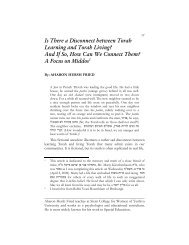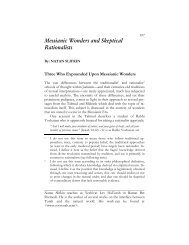“Eleh Ezkerah”: Re-reading the Asarah Harugei Malkhut - Hakirah
“Eleh Ezkerah”: Re-reading the Asarah Harugei Malkhut - Hakirah
“Eleh Ezkerah”: Re-reading the Asarah Harugei Malkhut - Hakirah
You also want an ePaper? Increase the reach of your titles
YUMPU automatically turns print PDFs into web optimized ePapers that Google loves.
264 : Ḥakirah, <strong>the</strong> Flatbush Journal of Jewish Law and Thought<br />
יֵנ ְפּ לאֶ ת ֶכֹר ָפּ ַל תי ֵבּ ִמ שׁדֹקּ ֶ הַ<br />
לא ֶ ת ֵע ל ָכ ְב אֹ בָי לאַ ו ְ ךָיחִ א ָ ןֹרהֲ א ַ לא ֶ ר ֵבּדּ ַ<br />
תרֹפּ ֶ ַכּה ַ ל ַע האֶ רָ א ֵ ן ָנ ָע ֶבּ י ִכּ תוּמָי אֹ לו ְ ןֹראָ ה ָ ל ַע ר ֶשׁ א ֲ תרֹפּ ֶ ַכּהַ ה ָלֹע ְל לִיא ַ ו ְ תאטָּ חַ ְל רקָ ָבּ ן ֶבּ ר ַפ ְבּ שׁדֹקּ ֶ ה ַ לא ֶ ןֹרהֲ א ַ אֹ בָי תאֹ ז ְבּ<br />
“Speak to Aaron your bro<strong>the</strong>r that he shall not come at all<br />
times to <strong>the</strong> Kodesh from outside <strong>the</strong> curtain…<br />
With this shall Aaron come to <strong>the</strong> Kodesh, with a calf as a sin<br />
offering and a ram for an Olah.”<br />
Now in R. Yishmael’s entry here, “bi-Zot” describes <strong>the</strong> decree<br />
of martyrdom as if it were a prelude to <strong>the</strong> Avodah.<br />
But <strong>the</strong> pargod’s primary sense here is, as in many sources, of<br />
hearing decrees " דוגרפה ירוחאמ,<br />
" “from behind <strong>the</strong> curtain,” <strong>the</strong> space,<br />
between <strong>the</strong> living and <strong>the</strong> dead, from where decrees upon <strong>the</strong> living<br />
are announced (Bavli Berakhot 18b), <strong>the</strong> space between <strong>the</strong> Shekhinah<br />
and <strong>the</strong> heavens (Rashi, ad. loc.), <strong>the</strong> place of God’s Throne in<br />
Heaven (Targ. Job 26:9: " הירקיד אננע יולע אדוגרפ ךיה סרפ"<br />
).<br />
Thus in Bavli H�agigah 15a it is heard “from behind <strong>the</strong> curtain”<br />
that Aher’s repentance will not be accepted, or in Bavli Sanhedrin<br />
89b that Isaac is himself <strong>the</strong> sacrifice. In Devarim Rabbah<br />
(Leiberman ed., va-Eth�anan) <strong>the</strong> Sar ha-Penim, officer of <strong>the</strong> inner<br />
sanctum, tells Moshe he heard from behind <strong>the</strong> curtain that his prayers<br />
to enter Israel will not be accepted (combining <strong>the</strong> <strong>the</strong>mes of<br />
information from behind <strong>the</strong> curtain and <strong>the</strong> pargod as <strong>the</strong> curtain<br />
of <strong>the</strong> Holy of Holies). Significantly, in Bavli Yoma 77a Gabriel defends<br />
Israel from behind <strong>the</strong> curtain.<br />
But <strong>the</strong>re’s more. In Targum Jonathan to Gen 37:17 (“And <strong>the</strong><br />
man [ish] said, “They traveled from here for I heard <strong>the</strong>m say [ יכ"<br />
" םירמא יתעמש],<br />
‘Let us go to Dothan,’” where Joseph goes to be<br />
sold), Gabriel [“<strong>the</strong> ish Gabriel” (Dan. 9:21), here <strong>the</strong> “Ish Lavush ha-<br />
Badim”], tells Joseph: " אדוגרפ רתבמ תעמש םורא,<br />
" “For I heard from<br />
behind <strong>the</strong> curtain,” that <strong>the</strong>y went <strong>the</strong>re. In dual equation, Eleh<br />
Ezkerah equates R. Yishmael’s entry, and its parallel danger and<br />
punishment and martyrdom for Joseph’s sale, with <strong>the</strong> Yom Kippur<br />
Avodah that atones for it.<br />
The pargod is invoked again in <strong>the</strong> piyut’s closing request that<br />
God see “<strong>the</strong> spilled blood of <strong>the</strong> righteous and <strong>the</strong>ir sprinkled blood<br />
on Your pargod ( " ךדוגרפב"<br />
).”<br />
. םמד תיצמתו םיקידצה םד תכופשת\<br />
םימורממ הטיבה ןונח<br />
.<br />
םימחר אסכ לע בשוי ךלמ ל-א\<br />
םימתכ ריבעהו ךדוגרפב הארת

















